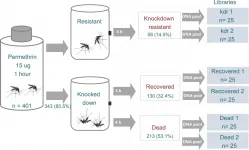New tools needed to effectively and fairly plan relocation of those displaced by climate
2021-06-17
(Press-News.org) Current approaches for planning relocation for potentially millions of people affected by climate change and related risks are "woefully inadequate" and risk worsening societal inequities, experts wrote in a policy perspective on June 17 in Science. Policymakers and scientists need to rethink how they work together to develop, communicate and carry out relocation plans.
"Relocation involves moving people away from risk and into totally new settings," said the team of experts led by Richard Moss. Moss is a Gerhard R. Andlinger Visiting Fellow at Princeton's Andlinger Center for Energy and the Environment and a senior scientist at the Joint Global Change Research Institute (JGCRI), a partnership between Pacific Northwest National Laboratory and the University of Maryland.
Relocation "places demands on science and governance ... to manage trade-offs across interests, uncertainties in knowledge, and institutional ambiguity created by overlapping jurisdiction, authorities and expertise," the authors wrote. Past policy failures and deep structural inequalities in society have contributed to many of the displaced people being vulnerable in the first place and have frequently excluded them from planning processes, which makes successful relocation even more difficult. An ethical and responsible approach that serves those affected will require a "pluralistic and integrated approach to action-oriented knowledge."
Moss is chair of the Science for Climate Action Network and has participated in national and international assessments such as the IPCC. The other authors include Patrick Michael Reed, a professor of engineering and Antonia Hadjimichael, a postdoctoral researcher, at Cornell University. Co-author Julie Rozenberg is a senior economist at the World Bank.
The authors said that in addition to diversifying knowledge sources and types, government agencies and decisionmakers need to collaborate with scientists to execute strategies under uncertainty. They said it's important that the research community not only identifies good practices in engineering, financial risk, and other technical analyses but also supports social transformation and capacity building that enables relocating communities to get back on their feet.
They said improving governance will require addressing structural inequalities and many perverse incentives that go against societal goals, such as federal policies that inadvertently encourage people to settle in risk-prone areas. Innovations are needed to address organizational silos, poor planning and risk communication, psychological attachments to place, and dependence of local governments on continued occupation of risky areas for tax revenues. The authors suggest incorporating diverse perspectives in problem framing, varying knowledge sources and types, sampling from a range of plausible futures to evaluate decision options, and using trained intermediaries as possible ways to navigate planned relocation in a more responsible and less damaging way. The hope is that the communities that are relocating will thrive after the relocation, but that relies on a transformation in how science is used, what tools are deployed, and how stakeholders are engaged in the processes, according to the authors.
INFORMATION:
ELSE PRESS RELEASES FROM THIS DATE:
2021-06-17
The Yellow fever mosquito (scientific name, Aedes aegypti) spreads multiple untreatable viruses in humans and is primarily controlled using a pesticide called permethrin. However, many mosquitoes are evolving resistance to the pesticide. A new study by Karla Saavedra-Rodriguez of Colorado State University and colleagues, published in the journal PLOS Genetics, identifies mutations linked to different permethrin resistance strategies, which threaten our ability to control disease outbreaks.
When treated mosquitoes encounter permethrin in the wild, they will do one of the following: immediately die, be knocked out but recover, or be unaffected. Saavedra-Rodriguez and her colleagues decided to investigate the genetic variations that lead to these ...
2021-06-17
A new treatment approach focused on fixing cell damage, rather than fighting the virus directly, is effective against SARS-CoV-2 in lab models.
Combination of two drugs reduces spread of SARS-CoV-2 infection in cells by up to 99.5%.
If found safe for human use, this anti-viral treatment would make
COVID-19 symptoms milder and speed up recovery times.
When a person is infected with SARS-CoV-2, the virus that causes COVID-19, it invades their cells and uses them to replicate - which puts the cells under stress. Current approaches to dealing with infection target the virus itself with antiviral drugs. But ...
2021-06-17
Patents with all-female inventor teams are more likely than all-male teams to address problems that specifically or disproportionately affect women, according to a new study. The findings, derived from an analysis of more than 440,000 U.S. biomedical patents filed from 1976 to 2010, suggest that who benefits most from innovation largely depends on who gets to invent. While the gender gap in research and innovation is well known, its broader impact on what gets invented - and for whom - isn't well understood. To address this question, Rembrand Koning and colleagues used machine learning text analysis to evaluate all U.S. biomedical patents filed from 1976 to 2010. They found that patents ...
2021-06-17
Daunting and uncertain is the future for people who must decide whether, where, when, and how to vacate their homes as the climate changes. Communities who will absorb this influx of uprooted people also face challenges. In a special issue of Science, "Fallback Strategies: Planning for Climate-Induced Relocation," experts examine ways in which interdisciplinary basic and applied research can - and must - engage with and support communities and governments navigating this landscape. As this work is done, "we must consider not only what science can do, but how science ...
2021-06-17
Using LIGO's suspended mirrors, researchers have demonstrated the ability to cool a large-scale object - the 10-kilogram optomechanical oscillator the suspended mirrors form - to nearly the motional quantum ground state. Upgrading LIGO (Laser Interferometer Gravitational-Wave Observatory) with such a modification would not only increase the device's sensitivity and range in detecting gravitational waves but could also provide new insights into large-scale quantum phenomena. For most mechanical objects to be coaxed into a quantum state, they need to be cooled to exceedingly low temperatures to overcome the thermal vibrations, or phonons, that mask the signature of quantum motion. This brings the ...
2021-06-17
Marine-terminating glaciers may be less vulnerable to rapid and irreversible collapse than previously suggested, according to a new study, which finds that ice cliff collapse is limited by upstream thinning of the ice sheet and how quickly calved icebergs and sea-ice float away. The glaciers of Greenland and Antarctica slowly flow to the sea, terminating in massive vertical ice cliffs. Occasionally, these partially submerged margins can collapse under their own weight and trigger rapid disintegration of ice sheets. It's thought that this process, called marine ice cliff instability (MICI), could lead to the catastrophic retreat of some of the planet's largest ice sheets, substantially contributing to global sea level rise. However, current ...
2021-06-17
CAMBRIDGE, MA -- To the human eye, most stationary objects appear to be just that -- still, and completely at rest. Yet if we were handed a quantum lens, allowing us to see objects at the scale of individual atoms, what was an apple sitting idly on our desk would appear as a teeming collection of vibrating particles, very much in motion.
In the last few decades, physicists have found ways to super-cool objects so that their atoms are at a near standstill, or in their "motional ground state." To date, physicists have wrestled small objects such as clouds of millions of atoms, or nanogram-scale objects, into such pure quantum states.
Now for the first time, scientists at MIT and elsewhere have cooled a large, human-scale object to close to its motional ground state. The object ...
2021-06-17
Research conducted by Qiang et al has discovered a link between a protein in red blood cells and age-related decline in cognitive performance. Published in the open access journal PLOS Biology on 17th June 2021, the study shows that depleting mouse blood of the protein ADORA2B leads to faster declines in memory, delays in auditory processing, and increased inflammation in the brain.
As life expectancies around the world increase, so are the number of people who will experience age-related cognitive decline. Because the amount of oxygen in the blood also declines with age, the team hypothesized that ...
2021-06-17
CLEVELAND--Case Western Reserve University researchers studying prions--misfolded proteins that cause lethal incurable diseases--have identified for the first time surface features of human prions responsible for their replication in the brain.
The ultimate goal of the research is to help design a strategy to stop prion disease in humans--and, ultimately, to translate new approaches to work on Alzheimer's and other neurodegenerative diseases.
Scientists have yet to discover the exact cause of Alzheimer's disease, but largely agree that protein issues play a role in its emergence and progression. Alzheimer's disease afflicts more than 6 million people in the U.S., and the Alzheimer's Association ...
2021-06-17
UTICA, NY -- More than 2 million coronary artery stents are implanted each year to help protect or restore normal blood flow to the heart, to treat patients suffering from angina or a heart attack due to coronary artery disease (CAD). While stents are highly effective and safe devices, scarring or clotting of unhealed stents can occur in a small percentage of subjects, leading to complications such as stent restenosis or thrombosis, which can be life-threatening. At present, approaches to understand stent healing based on their biological clotting status is unavailable in patients.
To devise a potential solution to this problem, Dr. Jason McCarthy, an Associate Professor at the Masonic Medical Research Institute (MMRI), and his team have developed a fluorescent probe that binds ...
LAST 30 PRESS RELEASES:
[Press-News.org] New tools needed to effectively and fairly plan relocation of those displaced by climate


